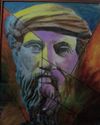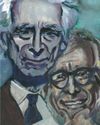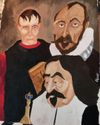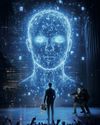
In the 2022 superhero film Doctor Strange in the Multiverse of Madness, Wanda Maximoff (played by Elizabeth Olsen) completes the frightening transformation from hero to villain that she began in the Disney+ show WandaVision (2021). Now possessed by the Darkhold, a mystical book that corrupts the mind of those who use it, Wanda is fully unleashed as the evil and incredibly powerful Scarlet Witch. She can alter reality with her mind, and she is willing to perform unspeakable acts for the sake of her imaginary (or alternative universe) children. Yet through the film’s depictions of its villain’s many gruesome deeds, it poses a philosophical question about personal identity: is the Scarlet Witch actually Wanda at all, or is she now a different being entirely?
In a previous film column here (on WandaVision, in Issue 152), I articulated a concept I call the ‘identity algorithm’. This is the idea that the key to anyone’s identity is the unique decision-making matrix encoded into his or her brain activity through the combined influences of their genetics and their vast web of personal experiences. These two influences interact in complex ways to produce an individual’s unique thoughts and actions when faced with new situations.
Since one’s identity algorithm (a.k.a. personality) is always evolving and changing due to the continual impact of new experiences, you might expect this theory to conclude that the Scarlet Witch is Wanda, simply with an updated version of her brain identity algorithm as a result of her exposure to the Darkhold. Yet I do not believe this to be the case. I want to argue that the Scarlet Witch is not in fact Wanda Maximoff.
この記事は Philosophy Now の December 2023 / January 2024 版に掲載されています。
7 日間の Magzter GOLD 無料トライアルを開始して、何千もの厳選されたプレミアム ストーリー、9,000 以上の雑誌や新聞にアクセスしてください。
すでに購読者です ? サインイン
この記事は Philosophy Now の December 2023 / January 2024 版に掲載されています。
7 日間の Magzter GOLD 無料トライアルを開始して、何千もの厳選されたプレミアム ストーリー、9,000 以上の雑誌や新聞にアクセスしてください。
すでに購読者です? サインイン

FALLING DOWN
Thomas R. Morgan considers how personal identity is maintained, and how it is lost.

Pythagoras (570-495 BCE)
Daniel Toré looks beyond the mathematician to the philosopher.

Wordsworth & Darwin
Christine Avery wonders whether poetry can help us to deal with science.

Plants & Philosophy
Caroline Deforche sees similarities between gardening and philosophising.

Dr.Gindi sculptor, has a philosophical conversation with Richard Baron about sensation, life, infinity and, you guessed it, sculpture.
Dr. Gindi is one of Switzerland's foremost sculptors, whose work has been exhibited in many countries.

Thomas Aquinas on Extraterrestrial Life
Babatunde Onabajo tells us why Aquinas did not believe in aliens.

The Fire This Time
Tim Madigan on Ray Bradbury, Bertrand Russell and Fahrenheit 451.

Trust, Truth & Political Conversations
Adrian Brockless wants a recognition of human value in political debate.

Philosophy & The Crown
Vincent Di Norcia on monarchy and stability.

Technologists & Ethicists
Stephen L. Anderson laments inadequate moral insight among tech leaders.